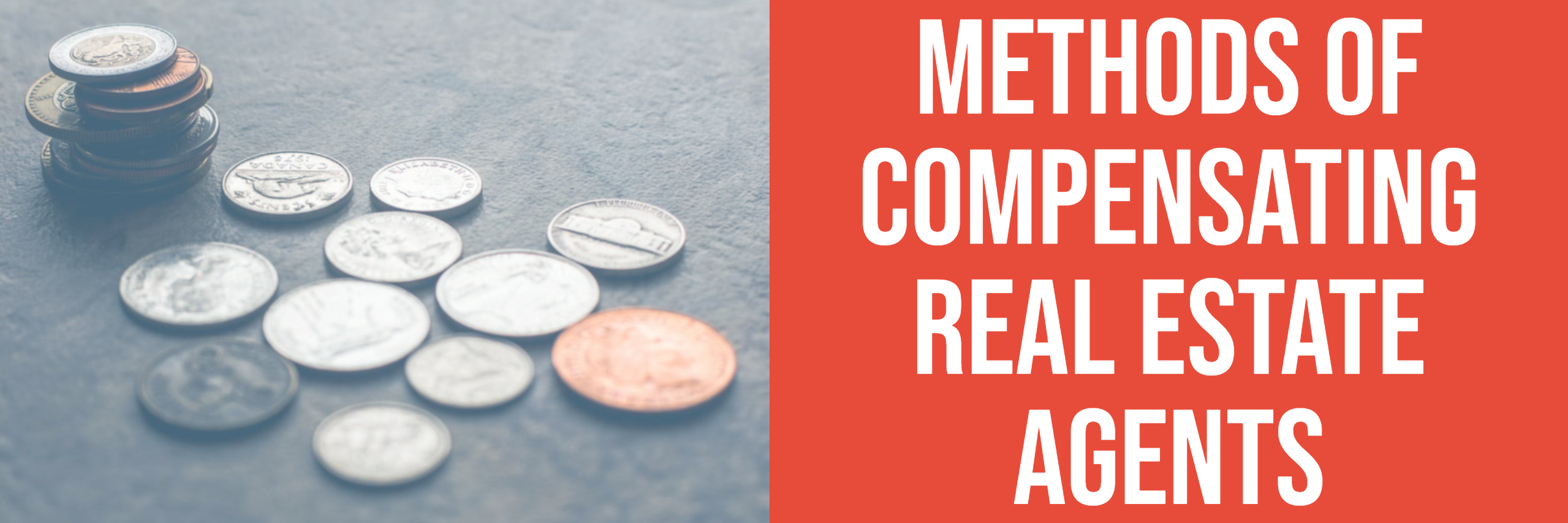5 Different Ways Real Estate Agents Get Paid
Real Estate Agent Compensation Explained
There are really only a two different ways to get paid your commission split as a Real Estate Agent or as a Broker Associate, and ultimately, the split may or may not be the most important factor when choosing your employing Broker.
I’ve been seeing a lot of ads on social media lately, and quite frankly, they all preach the same message. None of them really stand out. Everyone touts high commission splits, leads, and training, but the truth is, most of them don’t offer any of those things, and so ultimately, even if you do get 100% commission-100% of nothing is still nothing.
I myself had take a hard look in the mirror and a cold shower and analyze my own brokerage and ask myself, “Would I really want to work here?” So, all things being equal, let’s assume that the only thing you might be missing or need clarification on, is the commission split and which type of split would benefit you the most.
The Traditional Broker/Agent Commission Split
I’m sure most of you are familiar with this model. An escrow closes. A gross commission that has been pre-approved by the seller AND the Broker is cut from escrow. Depending on what agreement you have with your Broker this check may be disbursed directly to you OR the Broker may require that the check be sent to them until the file is signed off for compliance purposes and then a check is cut by the Broker to you the Agent. In our firm we encourage the agents to have their files signed off by the Transaction Coordinator 3-4 days prior to closing so that escrow can pay agents direct.
Here’s an example:
- Gross commission amount of a transaction = $12,000.
- Broker/Agent split of 50 percent broker/50 percent agent = $6,000 to the broker and the same to the agent.
The percentage split is an amount agreed to by the Broker and the Agent and usually reflects the level of services and support the broker provides. It can also reflect the volume of business the agent brings in. Highly productive agents can negotiate better splits.
There are two sides to this dark reality.
- A Broker’s profit margin is slim to none with Top Producing Agents, and even less on Real Estate Teams. Team Leaders are Agents and/or Broker Associates who are operating as a Brokerage without the liability or responsibility that the Broker shields the whole team from. If it looks like a duck, walks like a duck, and quacks like a duck, guess what? It’s a duck, and yet it isn’t. Not when it comes to teams. This isn’t me bitching. This is me sharing the honest truth. You can’t hate the player. Hate the game, and the game done changed. Far too many Brokers haven’t adapted to this new age of real estate where Teams take precedence.
- To make up for lost profits most Brokerages rely on new agents with significantly lower commission splits under the pretense that the Brokerage is going to have to invest a lot of time and resources into training a newer agent on how to be successful. While this might be true, the training that most Brokerages offer is “Monkey see. Monkey do.” and is not scalable by any stretch of the imagination. eXp and maybe KW were two of the first real estate companies to embrace online trainings. It doesn’t take a genius to figure out that under this model a Brokerage needs new inexperienced agents as an income stream just to survive. It’s not a healthy relationship. Trust me. I’ve been there.
The 100 Percent Commission Split Model
Enter the 100% Commission split model. In this compensation model, the agent gets the entire commission. This model can pay 100 percent to the agent because the agent is paying a “desk fee” or monthly office fee. In the case of our Brokerage, this fee is anywhere between $100-$300. Experienced producers prefer this model because their costs are capped while their income is not.
- The example from above would pay the full $12,000 to the agent.
- In this model, the agent might be paying anywhere from a few hundred dollars to more than a thousand dollars per month for a desk fee. This fee is frequently based on the type and size of the office space the agent is given. Another method is for the agent to pay a set fee per transaction to the broker.
The general perception of the 100% model is that it is ideal for veteran agents who don’t need any hand holding-only the occasional support from their Broker. In other words, since the Agent gets the whole commission check, the Broker has little incentive to get involved. This couldn’t be further from the truth. As someone who has not only studied both models, but has implemented them in my own brokerage, I can tell you that it is anything but an auto pilot system-even if the Brokerage has managers. The office won’t run itself and few to no businesses do.
The other myth is that new agents will not benefit from a 100% model because of the lack of training. Again, why would a Brokerage want to invest time in training agents who get the entire commission check?
Sadly, this is true with most 100% shops, and I blame the Broker Owners. These Brokers are more interested in the agents’ monthly office dues than they are concerned about offering real value other than an office to work in. Most people can work in Starbucks if they had to. Offering a desk and a printer won’t cut it anymore.
I was one of those Brokers. Don’t judge me.
I know what it’s like balancing a brokerage of over 100 agents, my own personal Sales production, and making sure all the bills were paid. It wasn’t easy. Some months were fantastic and some were horrendously frightening. I know what it’s like to be overly concerned with office desk fees under the 100% commission model, and I also know I’m not alone.
Now don’t get me wrong, in my state there are a few 100% Commission Brokerages that have figured it out. I recently wrote a blog post where I share my personal list of Top 10 Best 100% Commission Brokerages in CA. These Brokerages have struck the right balance between offering REAL value & training while still being able to pay their Agents the most money possible.
Even new Agents can thrive in the Brokerages on that list.
Referral Fees From One Brokerage to Another and Agent Split
Referrals come “off the top” before the commission is split. The referral is a negotiated percentage paid to another company for sending a client, either as a seller or a buyer. Here’s an example of a typical buyer referral:
- Brokerage A has a client selling their home and leaving the area. They refer the buyer client to Brokerage B in another state with a written referral agreement at a certain percentage of the final commission earned by Brokerage B.
- Using the $12,000 gross commission from above, and an agreed referral fee of 25 percent would give Brokerage A $3,000 for the referral, and Brokerage B’s agent and broker would split the remaining $9,000.
- Using the 50/50 split from the first example would yield $4,500 for the agent in Brokerage B.
Referrals are usually negotiated amongst Agents themselves and the referral fee of course can be negotiated as well, just bear in mind is no shortage of agents that would be willing to take a referral client at a discounted referral fee.
Percentage Paid to Real Estate Franchise for Business
Some of the major franchises charge a percentage fee “off the top” of each commission to their franchisee brokerages. This fee would come off the commission before the broker receives it and splits with the agent. Using a 7 percent franchise fee as an example:
1. The $12,000 gross commission from the deal would pay franchise $840, while broker and agent would split the remaining $11,160.
2. On the referral deal from above, the referral fee would normally come off first and the franchise percentage would come off of the $9,000. The agent and broker would then split $8,370.
3. Many consumers have the mistaken impression that their agent is pocketing the entire commission that they see on their settlement papers. It never hurts for them to be educated to these facts and understand the net commission actually received by the agent.
Other Less Traditional Real Estate Compensation Methods
With differing models appearing regularly for how brokerages charge their listing and buyer clients, there are many other ways an agent might be compensated…even by a salary. Some of the newer fixed-fee and fee-for-service listing brokerages are paying their agents a salary, rather than a commission. Some brokerages pay their agents a base salary and a lesser commission percentage for each transaction.












Leave a Reply